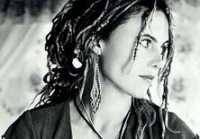“This album is loosely based around the notion of faith,” says Sheila Nicholls about her new album, Wake. “It’s about the troughs and peaks of having and not having it, what we choose to put it in, why it doesn't work and how vital it is to have it anyway.”
Sheila Nicholls knows all about taking risks. The poetic, political, acerbic and uncompromising singer-songwriter took a long and twisted route to arrive at her 1999 debut album, Brief Strop. “Growing up, I didn't even tell anyone I was writing songs,” she says. “In Colchester, Essex, the town and county in England where I'm from, you might as well tell someone you're going to become a lion tamer.” She was supposed to go to university, but the ruts of the old country did not look as interesting as reinventing herself, so she randomly found herself in LA. She wrote songs as she led a peripatetic existence of odd jobs including waitress, running kids’ arts programs, and volunteering as a musical director at City Kids Foundation in Los Angeles and New York, where she lived for four years after her van broke down there. “I lived in my van for a year,” she jokes. “Luckily for me it turned out to be a prerequisite for any self-respecting chick singer anyway.”
The result of her soul-searching was Brief Strop, a haunting album that earned her devoted fans and extensive touring, including a swing through Europe with k.d.lang. The album came out on her own artist-run label, Essex Girl Records, which Hollywood Records picked up for wider distribution. She also began a performance series in LA called “Chicks in Arms,” intended to nurture women artists. “Men are welcome to perform—so long as they proudly wear a skirt,” she explains, grinning, “Would you like sugar with that?”
Wake is a deeper exploration of the self-made woman. “One endeavors to stay viscerally connected to the biggest possible questions,” she says. "The word ‘wake’ is a triple-entendre—getting up in the morning, the trail a boat makes through the water, and the celebration of someone's death. The choices and actions we take in life leave a very specific trail, which causes me to work at taking responsibility as often as I can remember this."
That includes making risky artistic decisions. For Nicholls’ DIY sensibility, the hardest thing to do was to collaborate with an outside producer—let alone with a mega producer like Glen Ballard. Once again, however, she took the leap, explaining, “Having already established my voice with Brief Strop, I decided to call my own bluff and open my next project to several producers and see what came back. Though I’d already written the album, through these collaborations I ended up writing some new songs.”
“When I first met Glen, I think both of us were a bit ambivalent about working with each other. I’m sure he just looked at me as another random chick singer,” she says. And she was worried that the writer/producer of Alanis Morrissette’s “Jagged Little Pill” and No Doubt was too mainstream. “I wish he would have been a loser, because that would have helped me keep my stereotype in place,” she chuckles. “Finally I got over myself and decided, okay, let’s drop the lonely girl politics for a second and try collaboration for a laugh.”
The pair co-wrote some outstanding songs on Wake, including “How Strong,” “Breath,” and of course “Faith,” about which Sheila notes, “It's about the ultimate surrender to faith, because there's sometimes a glorious point where you have no choice. We're back to that love thing again, when we have no choice but to always be let down, and then pick ourselves up and do it again.”
Other producers added elements she’d been looking for. In London, she recorded four songs with Jakko Jakszyk, who added a retro Brit orchestral feel to a cover of Leslie Duncan’s "Love Song.”
“Covering ‘Love Song’ is actually kind of an ode to an old K-Tel Top-40 tape that revolved in my dad's car. As cheesy as those songs were, they were incredibly uplifting in their naff ‘70s half-step key changes as we sang them on the way to Brightlingsea.” Elton John covered the song on Tumbleweed Connection.
Back in LA, she met Jez Colin at a party. The two hit it off, and his subdued dub beats combine with Sheila’s piano, cello, and guitar to propel “Bread and Water” and “Come to Me,” creating a funky, house-dubbish vibe that Sheila loves.
Nicholls also recorded a couple of the songs the way she knows best: by herself. Having recently moved into her first quasi-permanent residence in nearly a decade, a funky 1927 bohemian shack built on a hillside in the Echo Park neighborhood of Los Angeles, she decided to capture the vibe of the place. On “Ownership,” she pushed the piano onto her deck and recorded the song live with accidental sounds in the background. Similarly, “Seven Fat Englishmen” was recorded live to capture the spirit of where she wrote it—in a pub in Little Bentley, Essex, that is owned and run by her mother and brother.
In the end, her songs are still self-contained, and all about empowerment. “When people ask me about my faith, I say I have faith in myself,” she reflects. But from that beginning, a whole worldview emerges. “The ‘One Love’ message, professed by the great scholars Marley and Lennon,” she says, “reminds us all that we live according to an intricate web. Love and peace are not just repackaged 1960’s ideals, but are in fact probably the most radical concepts yet conceived by humanity.”
Source: http://www.indie-connections.com/details1.asp?band=Shelia+Nicholls
